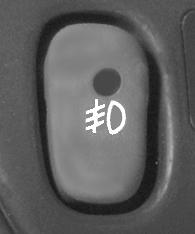Headlamps
See "Headlamps" under Turn Signal/Multifunction Lever .
Daytime Running Lamps (DRL)
Daytime Running Lamps (DRL) can make it easier for others to see the front of your vehicle during the day. DRL can be helpful in many different driving conditions, but they can be especially helpful in the short periods after dawn and before sunset. Fully functional daytime running lamps are required on all vehicles first sold in Canada.
The DRL system will make your low-beam headlamps come on at a reduced brightness when the following conditions are met:
| • | The ignition is on, |
| • | the exterior lamps control is in AUTO or the parking lamps only position, |
| • | the light sensor detects daytime light, |
| • | the parking brake is released, and |
| • | the shift lever is not in PARK (P) on vehicles with an automatic transaxle only. |
When the DRL system is on, the taillamps, sidemarker lamps, parking lamps and instrument panel lights will not be illuminated unless you have turned the exterior lamps control to the parking lamp position.
As with any vehicle, you should turn on the regular headlamp system when you need it.
Automatic Headlamp System
When it is dark enough outside, your automatic headlamp system will turn on your headlamps at the normal brightness along with other lamps such as the taillamps, sidemarker, parking lamps and the instrument panel lights. The radio lights will also be dim.
Your vehicle is equipped with a light sensor on the top of the instrument panel under the defroster grill, so be sure it is not covered which will cause the automatic headlamp system to be on whenever the ignition is on.
The automatic headlamp system may also be on when driving through a parking garage, heavy overcast weather or a tunnel. This is normal.
There is a delay in the transition between the daytime and nighttime operation of the DRL and the automatic headlamp systems so that driving under bridges or bright overhead street lights does not affect the system. The DRL and automatic headlamp systems will only be affected when the light sensor sees a change in lighting lasting longer than this delay.
If you start your vehicle in a dark garage, the automatic headlamp system will come on immediately. Once you leave the garage, it will take approximately one minute for the automatic headlamp system to change to DRL if it is light outside. During that delay, your instrument panel cluster may not be as bright as usual. Make sure your instrument panel brightness control is in the full bright position. See "Instrument Panel Brightness Control" under Interior Lamps .
To idle your vehicle with the automatic headlamp system off, set the parking brake while the ignition is off. Then start the vehicle. The automatic headlamp system will stay off until you release the parking brake.
As with any vehicle, you should turn on the regular headlamps when you need them.
Headlamps Off in Park (P)
To turn the headlamps off when it is dark outside, turn the exterior lamps control to the parking lamp position. In this position, the parking lamps, sidemarker lamps, taillamps, license plate lamps and instrument panel lights will be on, but the headlamps will be off.
To turn on the headlamps along with the other lamps when it is dark outside, turn the exterior lamps control to the AUTO or headlamp position.
Delayed Headlamps
The delayed headlamps feature will continue to illuminate the headlamps for 20 seconds after the key is turned to OFF, then the headlamps will automatically turn off.
To override the 20 second delayed headlamp feature while it is active turn the turn signal/multifunction lever up one position and then back to AUTO.
Fog Lamps

If your vehicle has this feature, the button for your fog lamps is located on the instrument panel, to the left of the steering wheel, beside the instrument panel brightness thumbwheel.
When using the fog lamps, the ignition must be on as well as the parking lamps or the low-beam headlamps.
Press the button to turn the fog lamps on and off. An indicator light on the button will glow while the fog lamps are on. The fog lamps will turn off while the high-beam headlamps are turned on.
